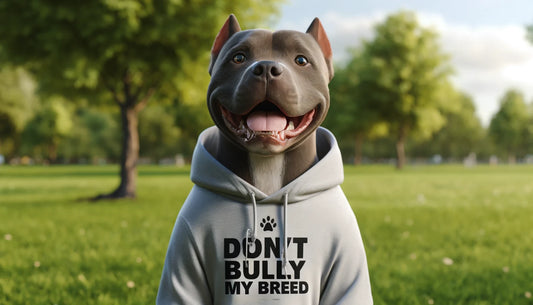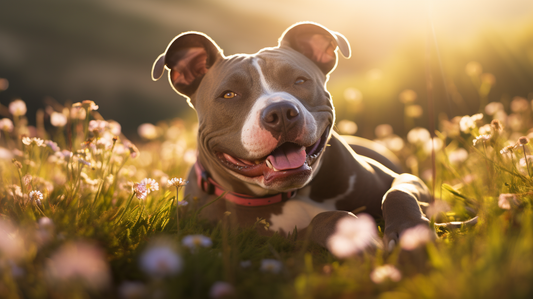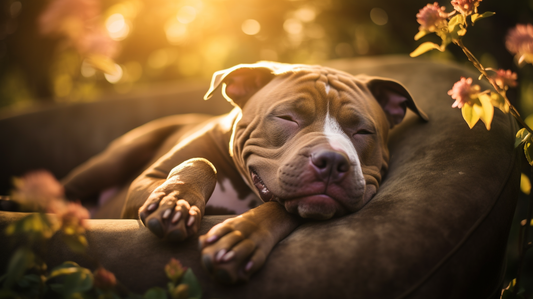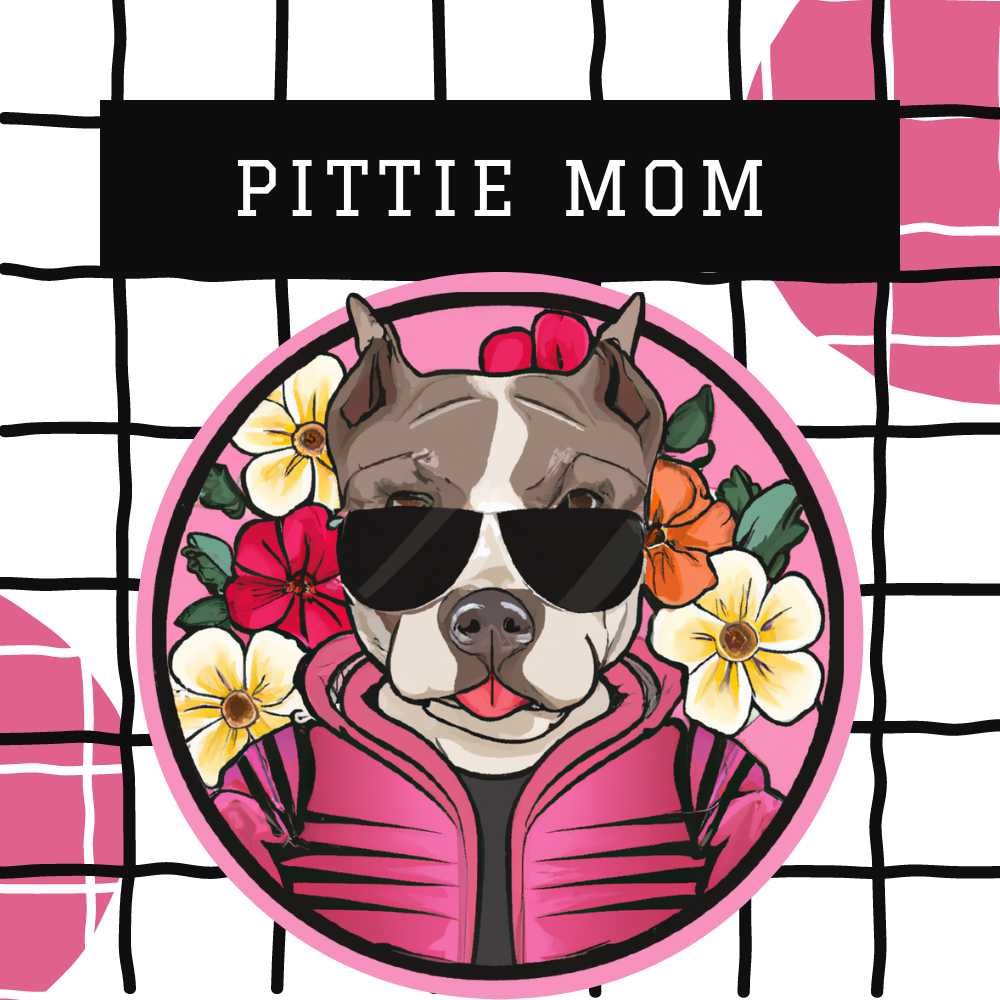Busting the Pitbull Myth: Understanding Breed Labeling and Combating Stigma
Tom DrachmanIntroduction
As a brand that is passionate about pit bulls and their welfare, Pittie Choy is committed to spreading awareness and education about the breed. Unfortunately, pit bulls have been the subject of misinformation, stereotypes, and even discrimination, largely due to misunderstandings about the term "Pitbull."
In this post, we aim to clear up some of the confusion surrounding the term "Pitbull" and highlight the importance of understanding breed labeling. By exploring the history of the term, the different breeds that fall under the "Pitbull" umbrella, and the common misconceptions surrounding Pitbulls, we hope to provide readers with a more accurate understanding of these amazing dogs.
Additionally, we will delve into the negative stigma surrounding Pitbulls and the impact it has on the breed and their owners. By understanding how breed labeling affects Pitbulls, adoption rates, and breed-specific legislation, readers can become better equipped to combat breed discrimination and advocate for Pitbulls.
Table of Contents
Understanding the term "Pitbull"
- "Pitbull" is not a breed but a term used to describe several breeds, including American Pit Bull Terrier, American Staffordshire Terrier, Staffordshire Bull Terrier, and others.
- Each breed has unique characteristics and temperaments.
- Common misconceptions about Pitbulls include the belief that they are inherently aggressive and dangerous.
Understanding the term "Pitbull" requires a deeper dive into its meaning and the breeds that fall under it. It is important to note that "Pitbull" is not a breed but rather a term commonly used to refer to a group of dog breeds that share similar physical characteristics. This group is often referred to as "Bully Breeds," and includes breeds such as the American Pit Bull Terrier, American Staffordshire Terrier, and Staffordshire Bull Terrier, among others.
The term "Pitbull" became popularized in the mid-19th century, when dog fighting was a popular pastime. Dogs with similar physical characteristics were bred for their strength and fighting abilities and were used in these brutal blood sports. However, as society has progressed, so has the understanding of dog breeds and their abilities.
Today, the term "Pitbull" carries with it a lot of misconceptions and negative stereotypes, often portraying these dogs as aggressive, dangerous, and unpredictable. It is important to remember that these are unfair generalizations and do not accurately represent the behavior of all dogs within this group.
By understanding the complexity of the term "Pitbull" and the breeds it encompasses, we can break down the stereotypes and misconceptions surrounding these dogs and appreciate them for the loyal and loving companions they can be.
Why "Pitbull" is not a breed:
Despite the common use of the term "Pitbull" to refer to a specific breed of dog, it is important to understand that Pitbull is not actually a breed. Rather, it is a term that is often used to describe several different breeds of dogs that share similar physical characteristics and temperaments. In fact, even the American Kennel Club (AKC) does not recognize a breed called "Pitbull." Instead, several breeds fall under the "Pitbull" umbrella term, including the American Pit Bull Terrier, American Staffordshire Terrier, Staffordshire Bull Terrier, and several others.
The different breeds that fall under the "Pitbull" umbrella:
As mentioned, several different breeds of dogs are often referred to as Pitbulls. Each of these breeds has its own unique history and characteristics, but they all share a muscular, stocky build and a reputation for being strong, energetic, and loyal. Some of the most common breeds that fall under the Pitbull label include the American Pit Bull Terrier, American Staffordshire Terrier, Staffordshire Bull Terrier, Bull Terrier, and the American Bulldog.
Common misconceptions surrounding Pit bulls:
Unfortunately, the term "Pitbull" has become associated with a number of negative stereotypes and misconceptions. Many people believe that Pit bulls are inherently aggressive, dangerous dogs that are more likely to attack humans than other breeds. However, this could not be further from the truth. In reality, Pitbulls are no more aggressive or dangerous than any other breed of dog. Like all dogs, their behavior is largely influenced by their environment and upbringing. It is important to judge each dog as an individual, rather than making assumptions based on breed or appearance.
The stigma surrounding Pit bulls
- The term "Pitbull" has become associated with negative stereotypes, such as aggression and danger.
- The media has perpetuated these stereotypes through sensationalized news stories and biased reporting.
- These stereotypes have led to discrimination against Pit bulls and their owners.
Pit bulls are often portrayed in the media as aggressive, dangerous, and violent dogs. Unfortunately, this has led to negative stereotypes and discrimination against them. As a result, pit bulls are among the most frequently surrendered and euthanized dogs in animal shelters.
The media has played a significant role in perpetuating these stereotypes. News outlets often report on pit bull attacks without providing context or investigating the circumstances surrounding the incident. This has led to an inaccurate portrayal of pit bulls as inherently aggressive and dangerous.
Moreover, breed-specific legislation has further reinforced these stereotypes. Breed-specific legislation refers to laws that restrict or ban certain dog breeds based on their appearance rather than their behavior. Pit bulls are often the target of these laws, which have been shown to be ineffective in reducing dog bites and attacks.
The impact of these stereotypes is not only on pit bulls but also on their owners. Pitbull owners often face discrimination and judgment from others who assume that they have a dangerous or aggressive dog. This can make it difficult for owners to find housing or insurance, and can even result in them being forced to give up their beloved pets.
It's important to recognize that the stigma surrounding pit bulls is not based on fact, but rather on misinformation and ignorance. Like any dog, pit bulls can be loving, loyal, and well-behaved when properly trained and socialized.
To combat this stigma, it's important to educate others about the truth about pitbulls and challenge negative stereotypes. By understanding the complexities of breed identification and the impact it has on pit bulls, we can work towards a more compassionate and just society for all dogs.
The impact of these stereotypes on Pit bulls and their owners:
The negative stereotypes associated with pit bulls have a significant impact on the dogs and their owners. Pit bulls are often discriminated against when it comes to adoption, with many shelters refusing to take them in or even euthanizing them simply because of their breed. This means that many loving and healthy pit bulls are left without homes or are even put down unnecessarily.
Furthermore, pit bull owners often face discrimination as well, with some landlords and insurance companies refusing to rent to or cover people who own pit bulls. This can make it difficult for pit bull owners to find housing and insurance coverage, adding unnecessary stress to their lives.
In addition, the negative stereotypes surrounding pitbulls can lead to a vicious cycle of fear and aggression. When people are afraid of pitbulls, they may act defensively or aggressively towards them, which can in turn cause the dog to become defensive or aggressive as well. This can lead to incidents where pitbulls are perceived as dangerous, even if they were simply reacting to a perceived threat.
It is important to recognize that pitbulls, like all dogs, are individuals with their own unique personalities and traits. By judging them solely based on their breed and perpetuating negative stereotypes, we do a disservice to these loving and loyal animals and the people who love them.
Why breed labeling is important
- Breed labeling affects the way Pitbulls are perceived and treated by society.
- Breed labeling can impact adoption rates, as some people may avoid adopting a Pitbull due to their negative reputation.
- Breed-specific legislation, such as breed bans, target dogs labeled as "Pitbulls" and can have serious consequences for these dogs and their owners.
Breed labeling can have significant consequences for Pitbulls and their owners. One of the main reasons why breed labeling is important is because it can directly impact the adoption rates of Pitbulls. Many people are hesitant to adopt a dog labeled as a Pitbull due to the negative stereotypes associated with the breed. This can lead to longer stays in shelters and fewer opportunities for Pitbulls to find their forever homes.
Another important reason why breed labeling is important is because it can contribute to breed-specific legislation. Breed-specific legislation (BSL) is a type of law that targets specific breeds of dogs, usually Pitbulls or breeds that are commonly labeled as Pitbulls. These laws often require certain breeds to be muzzled or even banned altogether in certain areas. BSL is controversial and widely criticized by animal welfare organizations, as it often punishes responsible dog owners and does little to address the root causes of dog aggression.
Finally, breed labeling can also impact the way that Pitbulls are perceived by society. When a dog is labeled as a Pitbull, it is often assumed to be dangerous or aggressive, regardless of its individual temperament or behavior. This can lead to discrimination against Pitbulls and their owners, and can make it difficult for them to find housing or insurance coverage.
In short, breed labeling is important because it can impact adoption rates, contribute to breed-specific legislation, and perpetuate negative stereotypes about Pitbulls. It is important for individuals and organizations to advocate for accurate breed identification and to work towards reducing the stigma surrounding Pitbulls.
How breed labeling affects breed-specific legislation:
Breed-specific legislation (BSL) is a controversial policy that targets specific breeds or types of dogs, such as Pitbulls, with restrictions or bans. BSL has been implemented in many cities and countries around the world, despite opposition from animal welfare organizations and experts who argue that it is ineffective and discriminatory. Breed labeling can contribute to the enforcement of BSL, as authorities may rely on visual identification to determine which dogs are subject to restrictions. This can result in innocent dogs being labeled as "dangerous" or "aggressive" based solely on their appearance, while actual behavior and temperament are disregarded. The negative consequences of BSL can include higher euthanasia rates for targeted breeds, as well as negative impacts on the community as a whole. By understanding the importance of breed labeling and the impact it has on breed-specific legislation, we can work towards more fair and effective policies that prioritize public safety and animal welfare without unfairly targeting certain breeds or types of dogs.Conclusion
We encourage our readers to join us in this mission by supporting Pitbull rescue organizations, educating others about the truth about Pitbulls, and advocating for responsible ownership practices. Together, we can help create a world where all dogs are valued and loved for who they are.
We invite you to take action today by sharing this post with your friends and family, volunteering with a local Pitbull rescue organization, or simply sharing your own positive experiences with these incredible dogs. Together, we can help create a brighter future for Pitbulls and all dogs.






